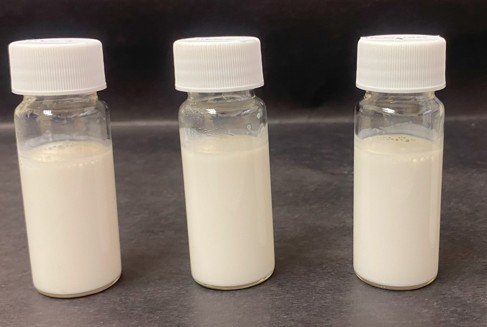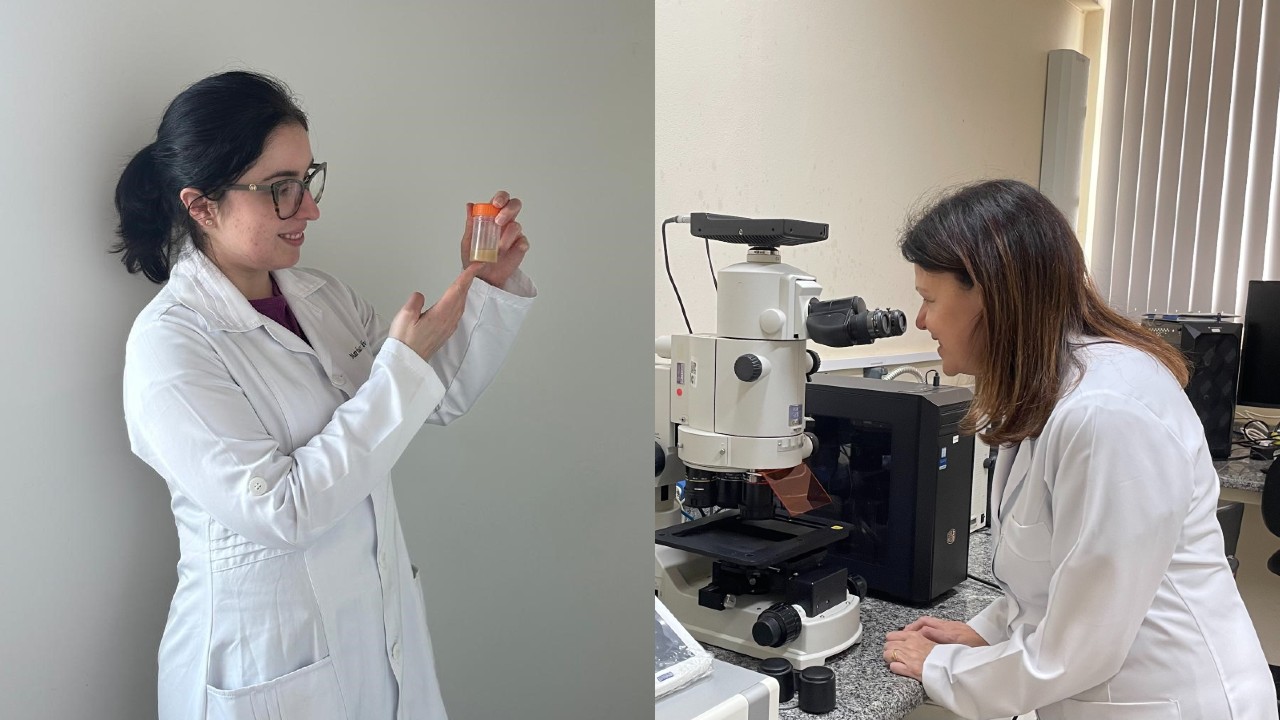

Oil-in-water emulsions stabilized with pea protein and guarana extract (photo: Rosiane Lopes da Cunha & Marluci Palazzolli da Silva Padilha)
The strategy developed at the State University of Campinas consists of submitting the ingredient to heat treatment and combining it with guarana extract and vitamin D. The result could become an alternative to animal products.
The strategy developed at the State University of Campinas consists of submitting the ingredient to heat treatment and combining it with guarana extract and vitamin D. The result could become an alternative to animal products.

Oil-in-water emulsions stabilized with pea protein and guarana extract (photo: Rosiane Lopes da Cunha & Marluci Palazzolli da Silva Padilha)
By Thais Szegö | Agência FAPESP – Research conducted at the State University of Campinas (UNICAMP) in São Paulo state, Brazil, shows that heat treatment of pea protein and addition of guarana extract result in a compound with significant potential to be used as an ingredient of plant-based beverages, offering a healthy and nutritious option for the food industry.
The pea protein combined with guarana extract was found to stabilize an oil-in-water emulsion enriched with vitamin D3.
The researchers who carried out the study, which was supported by FAPESP, are affiliated with the Process Engineering Laboratory at the School of Food Engineering (FEA-UNICAMP).
An article describing their findings is published in the journal Food Research International.
“Interest in plant-based proteins has grown in response to the boom in demand for foods of non-animal origin. Their growing use in food formulations is associated with technological properties such as the capacity to stabilize emulsions, form gel or foam, boost satiety, and supply essential amino acids,” said food engineer Rosiane Lopes da Cunha, last author of the article and full professor at FEA-UNICAMP.
However, water solubility of plant-based proteins is generally poor, a problem that impairs their properties and hinders their inclusion in food products. Scientists have therefore sought ways to improve solubility, some of which involve heat treatment and conjugation with extracts from plants rich in phenolic compounds, such as guarana (Paullinia cupana).
“The addition of guarana extract is an innovative strategy designed to valorize a product of the Amazon rich in bioactive compounds that interact with pea protein to enhance its capacity to stabilize emulsions,” said Marluci Palazzolli da Silva Padilha, corresponding author of the article and a postdoctoral researcher at FEA-UNICAMP.
Pea protein was chosen for its attractive properties, especially low cost, low allergenicity, emulsion and gelation, but commercial use of the isolate faces challenges such as unpleasant taste (off-flavor) and gritty texture, as well as the already noted poor water solubility, preventing its use in many food and drink products.
In the study, the researchers set out to verify whether heat treatment and conjugation with guarana extract altered the properties of pea protein so as to support its inclusion in food product formulations.

Marluci Padilha and Rosiane Cunha (photo: personal archive)
Methodology
In the first stage of the project, the researchers analyzed the technological changes undergone by pea protein as a result of heat treatment and conjugation with guarana extract. In the second stage, they prepared an emulsion using modified pea protein and vitamin D3. While vitamin D3 supplementation boosts the immune system and prevents rickets, it is unstable in water-based beverages and therefore requires conjugation with a stabilizer.
The researchers examined the impact of storing emulsions at 25 °C in the presence of ultraviolet light (UV). “The results showed that at least 77% of the vitamin D3 was preserved in these formulations after 30 days of storage,” Padilha said.
Lastly, an experiment designed to simulate the process of digestion was performed in order to assess the bioavailability of the vitamin D3. In this third stage, the researchers concluded that vitamin D3 bioavailability was higher in emulsions stabilized with pea protein and guarana than in emulsions stabilized only with pea protein.
Another promising conclusion was that the processes deployed in the study to modify pea protein are easily scaled up for use in the food industry. Heat treatment for 30 minutes at 90 °C is similar to slow pasteurization of dairy products and fruit juices, and pH adjustment (common in the food industry) to control the interaction between the phenolic compounds in the guarana extract and the pea protein can be monitored to assure safety and obtain the appropriate flavor.
“This approach opens up novel possibilities for the development of plant-based emulsifiers with enhanced functional properties. The results suggest that other plant proteins can also benefit from the strategy so as to bolster their applications in the food industry,” Cunha said. “However, it’s important to note that optimization of plant protein modification processes depends on the composition of both the protein and the phenolic extract utilized.”
The article “Combining heat treatment and conjugation between guarana extract and pea protein isolate to produce O/W emulsions loaded with vitamin D3” is at: www.sciencedirect.com/science/article/abs/pii/S0963996924012201.
Republish
The Agency FAPESP licenses news via Creative Commons (CC-BY-NC-ND) so that they can be republished free of charge and in a simple way by other digital or printed vehicles. Agência FAPESP must be credited as the source of the content being republished and the name of the reporter (if any) must be attributed. Using the HMTL button below allows compliance with these rules, detailed in Digital Republishing Policy FAPESP.





